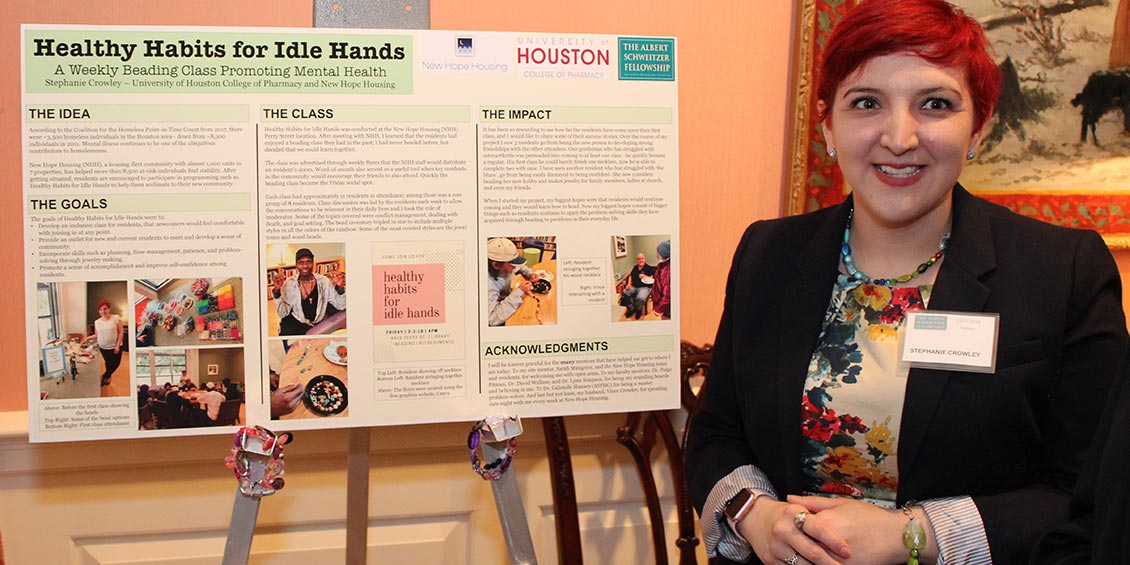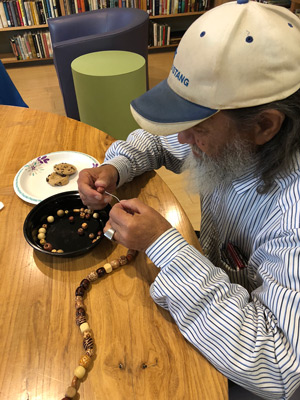Student News

Beading with Pride
UHCOP Student Crowley Hands Baton to Fellow Students with Completion of Community Project, Designation as Schweitzer Fellow for Life
It's said that "good things come in small packages," and UH College of Pharmacy Pharm.D. student Stephanie Crowley saw firsthand the truth of the idiom as residents of a nonprofit housing community aimed at breaking the cycle of homelessness expressed newfound confidence, pride and camaraderie in a tiny jewelry bead.
Crowley recently marked the completion of her yearlong work as a member of the 2017-18 Class of the Albert Schweitzer Fellowship Houston-Galveston with her new status as a "Schweitzer Fellow for Life," bestowed at the local chapter's Celebration of Service event April 12 at the Junior League of Houston.
The fellowship program, named in honor of the famed humanitarian and physician Dr. Albert Schweitzer, encourages students to develop projects to address the unmet health needs of vulnerable and marginal populations. It is a community-based, mentored multidisciplinary leadership development program that works to improve the health and well-being of underserved communities in the region.
With a strong interest in the intersection of homelessness, mental health and substance abuse, Crowley wanted to focus on providing resources and assistance for individuals wrestling with those issues in the long term.
"When addressing situations of addiction and abuse, there is a lot of focus on the acute phase of the recovery process, but not enough support for what happens to an individual afterward," Crowley said.
New Hope Housing
Crowley partnered with New Hope Housing, a nonprofit organization offering "affordable, permanent single-occupancy rental housing with support services for people who live on very limited incomes," to engage its residents in a constructive, personal development activity. With a little less than 1,000 beds across seven facilities in the Greater Houston area, the organization's "housing first" philosophy is centered on the concept that affordable housing is a fundamental step for those wrestling with homelessness and others barriers to establishing stability and hope in their lives, such as physical impairments, mental health disorders, or substance-abuse issues.

After meeting with New Hope's administrators, Crowley learned that a beading class had previously been offered at one of its facilities and decided to resurrect it. Crowley said being a stranger herself to the hobby of "beading" – making necklaces, bracelets and other types of jewelry (or even larger decorations) from hollowed glass, acrylic or wood shapes and string or wire – likely made it less intimidating for the residents. The beading process itself involves development and practice of such skills as planning, time management, patience and problem-solving, as well as providing a creative outlet.
"My two goals for my project were for it to be inclusive, so that everyone felt they were part of a larger community and not isolated, and for it be a productive activity," Crowley said. "What was surprising is that the class also attracted several people who weren't necessarily working on their coping skills as part of their mental health or addiction recovery, but had osteoarthritis, poor hand-eye coordination, or poor vision."
Overcoming Challenges
One of the first challenges that confronted Crowley and her class members was the difficulty some experienced trying to manipulate the extra-small beads left over from a previous beading class at the facility. Crowley then located larger beads that were easier to handle, but found that the residents actually rose to the challenge by setting a goal of working up to the smallest beads or beads with smaller holes over time.
"When you're working with the beads, inevitably you're going to accidentally let go of the string or bump your supplies, and the beads - and your work - ends up all over the floor and you feel embarrassed," Crowley said. "The first time couple of times it happened, they were obviously frustrated and ready to give up. But we treated it like it wasn't a big deal, and when it happened again, other people in the class would be supportive and help clean up, too. You really saw them develop a strong sense of community."
Crowley said the project was rewarding not only in helping to empower others and refining the interpersonal skills that she'll use daily in her pharmacy career, but also in bringing her closer to her husband, Vincent, who sacrificed their weekly "date night" to help out with the classes.
Establishing Tradition
Crowley joins UHCOP alumni and her Schweitzer program predecessors Eric Kao, Pharm.D. ('17), whose project was on "Supporting HIV Prevention Culture," and Jag Maturi, Pharm.D. ('15), whose project was on "Medication Management Intervention in the Non-profit Primary Care Setting."
Following in her footsteps will be the largest contingent of UHCOP students in the program, with three Pharm.D. students in the Class of 2018-19. Graziela Putnam is pursuing a project entitled "This week I will: A change through colors," while the college's first Schweitzer team of Annette Augustine and Rhea Soltau is working on "Collaboration of Local Organizations for Homeless Healthcare."